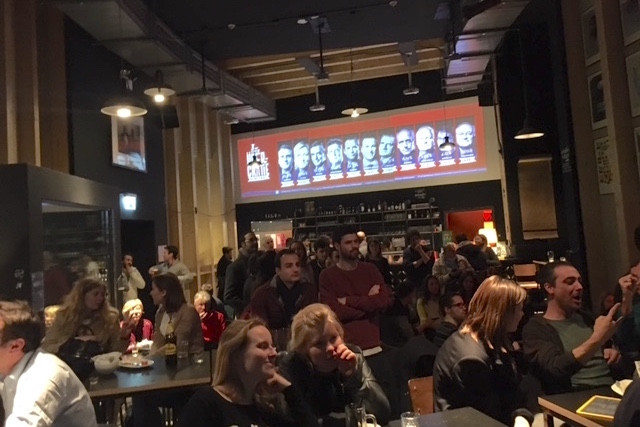The centrist Macron, former minister for the economy under the socialist François Hollande, got 23.86% of the votes, while Marine Le Pen, leader of the far right Front National (FN) received 21.43%.
Established parties wiped out
For the first time in the 5th republic, established in 1958, neither the Parti socialiste (PS) nor the Républicains (LR) will occupy the highest office in France. For the first time as well, there will be no centre right candidate in the second round of the elections. The combined score of their two candidates reached a record low of 26.3% of the votes. By comparison, their combined scores were 66% of the vote in 2007 and 55.8% in 2012.
The scandal plagued François Fillon (19.94%) came 3rd, missing the second round by 1.49% compared to Le Pen’s score. His results are a far cry from Nicolas Sarkozy’s in 2012, who managed to get 27.18% in the first round. A year ago, when he was elected candidate for the LR, his approval ratings were at 32% and he was set to win the election as the left was in tatters- however, he will be tried in court for having created fictional jobs for his wife and two of his children.
The PS candidate Benoit Hamon came only in 5th place with 6.35%, taking partly the brunt for the unpopular presidency of Hollande.
Macron only started his movement “En marche” a year ago. He has never been elected before. A centrist and pro-European, he has been congratulated by prime minister Xavier Bettel, European Commission president Jean-Claude Juncker, and German chancellor Angela Merkel.
Le Pen could increase her vote from 17.9% in 2012 by around 3%, but the extreme left Jean-Luc Mélenchon (France insoumise) managed to increase his share of the vote by 8% (from 11.1% in 2012 to 19.62%).
East/West, rural/urban cleavages
Looking at the electoral map, the clearest divide is between East and West. The East voted overwhelmingly for the FN candidate, while Macron won in the West. there is also a clear divide between rural (FN) and urban (Macron) votes.
In the Moselle, the bordering département to Luxembourg, where many of the French cross-border workers live, 28.35% voted for the FN, 21.05% for “En marche”, 17.9% for the extreme left Mélenchon, and 17.7% for the Republican Fillion.
In Meurthe-et-Moselle, another département from which many French citizens work in Luxembourg, the FN got 25.86%, Macron 22.05%, Mélenchon 20.36% and Fillon 16.5%.
However, in Thionville, Metz and Nancy (the biggest towns), Macron won.
76.21% of registered voters participated in the election; the abstention rate was 21.77%, which was a bit higher than in 2012. 2.58% were blank or invalid votes.
Challenges
The second round of the presidential election is on 7 May. The French will have to choose between a social-liberal pro-European and a nationalist authoritarian anti-European.
Polls and commentators suggest that Macron will win the election.
Marta Lorimer, a PhD candidate at the London School of Economics, has argued that both candidates face some challenges. Le Pen needs “a good score to consolidate her leadership. Not all members of the FN were fully convinced with her strategy of ‘de-demonisation’ cum economic protectionism, and failing to deliver could harm her position as leader of the party.”
For Macron, “it is still unclear whether he will be able to govern. France is a semi-presidential system, and to govern effectively, Macron needs a parliamentary majority. If he fails to win a majority in the legislative election in June--which could be a challenge, since he is still in the process of building his party--he could face an extended period of ‘co-habitation’ with a party whose support he does not fully command. In other words, he would have very little possibility to enact measures in his programme and in the long term, this could lead to even higher levels of disillusionment among the electorate.”
Earlier this year, Le Pen, an MEP, had her immunity from prosecution lifted for tweeting graphic images of ISIS victims. She can now be prosecuted for that and for the misuse of funds at the European Parliament.
